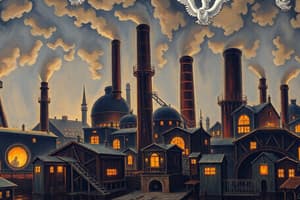Podcast
Questions and Answers
What are the causes of the Industrial Revolution?
What are the causes of the Industrial Revolution?
- Decreasing population
- Abundant supply of natural resources (correct)
- Increase in capital (correct)
- Upsurge in world trade (correct)
What changes occurred in the textile industry during the Industrial Revolution?
What changes occurred in the textile industry during the Industrial Revolution?
Demand for clothing due to the increasing population in Britain.
What were the primary power sources used during the Industrial Revolution?
What were the primary power sources used during the Industrial Revolution?
Electricity, water, steam.
Why was Great Britain the origin of the Industrial Revolution?
Why was Great Britain the origin of the Industrial Revolution?
What is one primary use of coal during the Industrial Revolution?
What is one primary use of coal during the Industrial Revolution?
What are cottage industries?
What are cottage industries?
Define mass production.
Define mass production.
What are interchangeable parts?
What are interchangeable parts?
What is capitalism?
What is capitalism?
What is socialism?
What is socialism?
What is the economic basis in the context of the Industrial Revolution?
What is the economic basis in the context of the Industrial Revolution?
What defines the cottage industry?
What defines the cottage industry?
Define the factory system.
Define the factory system.
What is the enclosure movement?
What is the enclosure movement?
What is a trade union?
What is a trade union?
What are strikes?
What are strikes?
What are corporations?
What are corporations?
Who was James Watt?
Who was James Watt?
Who was Thomas Edison?
Who was Thomas Edison?
Flashcards are hidden until you start studying
Study Notes
Causes of the Industrial Revolution
- Surge in global trade and rising population contributed to dramatic economic changes.
- Increased availability of capital through venture capitalists facilitated new business ventures.
- Abundant natural resources in Great Britain, particularly coal and iron, fueled industrial growth.
- Higher consumer demand, especially for cotton and pottery, drove innovation and production.
Changes in the Textile Industry
- Demand for clothing surged due to population growth in Britain, driving advancements in textile manufacturing.
- Early textile production relied heavily on manual labor and hand looms, indicating a labor-intensive process.
Industrial Revolution Power Sources
- A significant shift occurred in manufacturing and production methods starting in the mid-1700s, marked by machine use.
- Primary energy sources included electricity, water, and steam, transforming industrial capabilities.
Origins of the Industrial Revolution in Great Britain
- Great Britain possessed essential resources, skilled labor, and agricultural advancements.
- The combination of resources and a favorable economic environment set the stage for industrial advancements.
Coal Uses
- Coal emerged as a crucial energy source, powering steam engines and factories during the industrial boom.
Cottage Industries
- Small-scale industries such as weaving, sewing, and carving operated from homes, often relying on independent workers.
- These industries allowed laborers, often women, to maintain flexibility and independence.
Mass Production
- Refers to producing goods in large quantities with efficiency, reducing costs and labor time.
- Improvements in machinery facilitated easier and quicker production processes.
Interchangeable Parts
- Concept of using identical components in manufacturing, revolutionizing assembly and repair processes.
Capitalism
- Economic system centered on private property and free enterprise, motivating innovation and investment.
Socialism
- Economic system where society, usually through the government, controls production and distribution of goods.
Economic Basis
- Relationships and dynamics among people who drive economic activities and production.
Factory System
- Production model that centralized labor and machinery in one location, enhancing efficiency and output.
Enclosure Movement
- Refers to consolidating small farms into larger estates in 18th-century England, altering agricultural practices and land use.
Trade Union
- Organizations formed by workers to advocate for higher wages and improved working conditions.
Strikes
- Collective actions by workers refusing to work until certain demands regarding conditions are met.
Corporations
- Large business entities owned by multiple investors, pooling resources for expanded operations and growth.
James Watt
- Scottish engineer instrumental in improving the steam engine, enhancing its efficiency and performance.
Thomas Edison
- Renowned American inventor, famous for creating the electric light bulb and pioneering developments in sound recording and motion pictures.
Studying That Suits You
Use AI to generate personalized quizzes and flashcards to suit your learning preferences.




